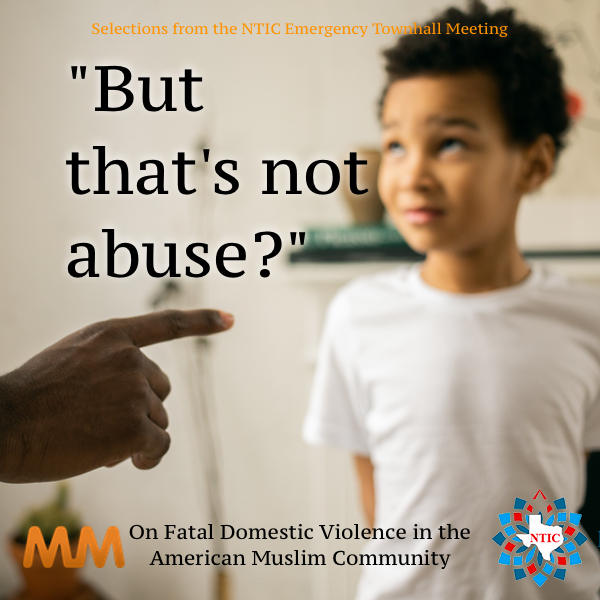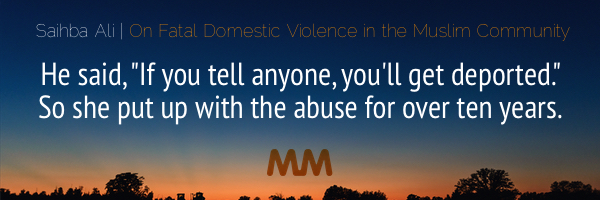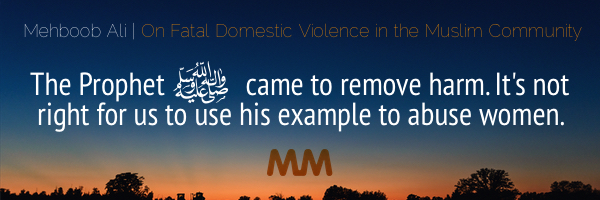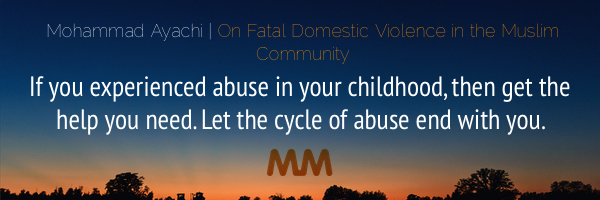Family and Community
“But that’s not abuse?” [Part 2] On Fatal Domestic Violence in The Muslim Community

Published

Part 1 | Part 2: “But that’s not abuse?”| Part 3| Part 4
Saihba Ali, LPC, LMFT, MAPS
I would like to begin with sharing a history. I’m going to change the name of the person obviously, we’re going to call the person that I’m speaking of Sana. This is a case study about a young woman; 18 years old. Innocent, sweet, petite, full of life, high-spirited, who got married and immigrated to the US with her husband.
She lived across the street from her in laws, and she was basically serving as maid for the house. She was part of a joint family. She has sister-in-laws, brother-in-laws, there were children – the four families. Her job every day was to go across the street and she serves as maid to their family. She was verbally, morally, emotionally, mentally abused by almost all family members. Her husband also abused her physically. Her whole purpose was to serve these people.
She wasn’t allowed outside the house, and she had never shopped for herself. Everything that she needed was brought to her — used or new — by her sister-in-law and the only purpose she had was to serve all of them.
Keep supporting MuslimMatters for the sake of Allah
Alhamdulillah, we're at over 850 supporters. Help us get to 900 supporters this month. All it takes is a small gift from a reader like you to keep us going, for just $2 / month.
The Prophet (SAW) has taught us the best of deeds are those that done consistently, even if they are small. Click here to support MuslimMatters with a monthly donation of $2 per month. Set it and collect blessings from Allah (swt) for the khayr you're supporting without thinking about it.
When she had children, she was not allowed to prioritize their work or affection for her over the needs of her in-laws. She lived like that for 10 years. For 10 years she’d never been to a store, she’d never been out. She didn’t know anyone. She didn’t visit anybody. All she knew was her home and her husband’s home where she was abused.
When she had children, they were taught to disrespect her. They were taught to ignore her. They were taught to not regard anything she said, and she was not allowed to do special things for them. She could cook for them, but couldn’t do her daughter’s hair or any of that.
When she spoke to her family back home, they told her, “You’re being ungrateful. You’re living in the United States. You have a roof over your head. You have what looks like a beautiful apartment to us. You’re not being grateful. You need to obey your husband, you need to serve him. That’s what you need to do.”
Anytime that she thought of leaving, she was told that they would kick her out, and they would get their son re-married. They didn’t even need her. When she started to object more, and when all her children were in school, they kicked her out of the house. She had no one to reach out to because she had never really met anyone except a neighbor of hers.
Somehow, she found her way to a culturally sensitive shelter. She found some resources, but guess what? She wasn’t legal in the United States because her husband had never filed for her green card.
Throughout her stay with him, she had constantly been threatened, “If you tell anyone what’s going on, you will get deported. You will go to jail, you will get deported, you will lose all contact with your children, you will never be able to see them again.” And for that purpose, she put up with abuse for 10 years.
Marital Harmony And Conflict Resolution: The Quranic Paradigm
Now, even when she was out, even when she was helped, she still couldn’t work. There were attorneys who helped her try to file for a green card but that took a lot of time. She couldn’t work, and she was denied access to her children.
And at some point, somehow, she managed to try and get visitation rights. The children for whom she had put up with 10 years of abuse were not granted to her into custody because she didn’t have a home. She didn’t have income. They were considered stable and comfortable with their extended family in their home, so she could barely see them.
When she actually met them, the children were trained to blackmail their mother to say, “You have to buy us these expensive gifts if you want to see us again. You have to buy us this, you have to do this or you won’t talk to us again.”
This poor woman kept trying her best to somehow complete those, and then, there came a time when she snapped. She said, “I’m not going to be controlled anymore. I’m not going to be controlled through my children,” and she chose to walk away.
When she walked away from that, she was devastated. She traveled between despair and rage. She was angry and upset, and she eventually had a mental breakdown. She ended up making bad choices about her life. She ended up trying to somehow find peace by going out and keeping bad company. She got into drug addiction, she fell prey to sexual predators, sex trafficking. And she had a mental breakdown from which she couldn’t recover.
I don’t know where she is, I don’t know how she is, I don’t even know if she’s alive, but I do know that when I had looked into her eyes, she was no longer the spirited, beautiful 18-year-old girl who had come to this country. All I saw was darkness, blank eyes. That girl had already died.
Mehboob Ali, LPC, Founder – Rahma Institute
A lot of times when we think about abuse, the first thing that comes to our mind is physical abuse. And often, physical abuse is a manifestation of abuse that’s been happening after a long period of time. And that’s when we see the end results of the bruises, and the cuts, and then the physical nature of that abuse. But prior to that, there are a lot of situations and scenarios that are happening at the house that lead up to that. So, it’s important for us to know the different types of abuse and what they are so we’re aware of them, Insha Allah.
So as we know, we talked about physical abuse, and I think that was pretty apparent in the case study that was shared. The other big form of abuse is emotional and mental abuse. Emotional and mental abuse is when you’re putting your will and your power on someone else and then taking away and impacting their emotional and mental well-being. You’re taking away their voice. You’re taking away how they should feel about certain situations. You’re taking away their happiness. In essence, you’re stripping them of the actual person they are, that’s emotional abuse.
SubhanAllah they say, sometimes emotional abuse is more impactful on a person more than even physical abuse, because now that person is hiding that abuse within themselves and no one else can see it. Physical abuse, someone might start noticing it. A parent, a family member, they might question them. But emotional abuse is something the person is hiding inside them, and often, no one else knows about it.
So, as leaders and as individuals in our community, that’s something that we have to look for. When someone comes to us for help, a friend, a family member, whatever it is, are there signs of emotional abuse? Is this person’s confidence down? Is their anxiety up? Are they no longer the happy loving person that they used to be? That’s emotional abuse.
Then there’s financial abuse. Financial abuse is you as the abuser overcoming that person’s right to financial needs. Taking away the basic needs that people have to eat, and drink, and live a healthy life. Interfering with their money. Perhaps not providing them money so they could have the basic needs that they need as an individual. That’s financial abuse.
Then there’s neglect. When you’re taking that individual, and you’re putting them in a corner. And not only are you putting them in a corner, but you’re making them neglect their own family and friends. You’re blocking them from reaching out to their parents and talking to them. You’re blocking them from having their friends over and you’re making them neglect the people that they care about and love in their own home.
Another form of abuse that we see, and we don’t talk often about it in our community as if it’s a taboo, is sexual abuse. SubhanAllah, this is the one that I find the most hard to work with as a therapist because not only is an individual physically abusing and emotionally abusing someone, now, they want to take advantage of them sexually. That’s just another form of you trying to impose your power, your will on someone else to meet your needs while neglecting the needs of the other person.
The last kind of neglect that we should be more aware of, especially for our kids and individuals who are in society, is digital abuse. That’s one that’s not often talked about, but digital abuse is this concept that, let it be social media, online friends, text messaging, whatever it is, you are sending messages to another party that are explicit in nature, abusive, and emotional. In doing so you’re putting your power and your will over the other person. And that is also a form of abuse.
That’s not just a ploy, that’s not simple text, that’s not a simple DM on social media. That is you trying to exert your power over that person. Digital abuse is a real thing and it’s happening more and more to our kids, so we need to be aware of it first of all as parents, but as individuals as well. It’s important for us to be aware of the different types of abuse, but it’s also important for us to walk away with solutions. What can we do proactively as individuals?
For a minute, I want to talk to our brothers. When we look at the life of the Prophet ﷺ, he was sent to this world to spread mawadda (love), rahma (mercy), and sakeenah (tranquility) in our families, and in our lives. He said the best amongst you is the best to his family. And then he said he is the best to his family.
He’s the one who came and gave rights to women when there were no rights. He’s the one who was the voice for the young children that were buried just because they were girls, SubhanAllah. The Prophet ﷺ came to take away these harms. So, it’s not right for us as brothers or as men to use religion as an excuse to abuse women.
If there are issues of compatibility, if there are issues of you not getting along with your wife, or your kids, or whoever it is, there’s ways to solve that. There are ways to even end those relationships in a proactive and healthy way rather than resulting in abuse.
Women’s Rights in Islam, a critical look at “Joys of Muslim Women”
As a father and as a husband, it starts with us. Forget our titles for a minute, we’re responsible to look in the mirror and say, “What are we doing to live this prophetic legacy with our families first and foremost,” because that’s where it starts.
Brother Majid made an amazing point that as parents, we’re the ones who empower our kids to act the way that they act. So, what examples are we in the house? How are we treating our spouses? That’s the message for our brothers, Insha Allah, and a reminder for all of us first and foremost, Insha Allah.
There is no room for abuse in our religion, we know that. So for all of us, for the general audience, (my advice is) to know your resources. So, if you sense there’s abuse in your own relationship or abuse in someone’s relationship that you know, there is a national domestic hotline. You can easily Google this, it’s open 24/7. If you need immediate help, or if you don’t know who to talk to, or if you don’t know how to address someone’s situation, call them up. There are professionals there, it’s anonymous, and they will give you good advice to get you started.
After that, SubhanAllah, as you can see here today, we have amazing resources in our community that you can lean on, that you can come to to get the help and advice you need, Insha Allah. And lastly, and most importantly, each one of us plays a role in this. I’m so happy that we’re doing this event, I’m so honored to be here. Let us not wait for something dramatic or tragic to happen to have these conversations. Let’s start it with our own families, with our own kids, and continue in it, Insha Allah.
Mohammad Ayachi, Founder – Guardians Foundation
At the end of the day, the best example, of course, that we can give is the Prophet ﷺ, and the main thing he said, in a hadith of course, is to always be good to your family. The thing about abuse is that there are different factors and different ways that we get ahead of it and try to cleanse our community or this issue. It’s essentially an illness, it can be contagious between other people as well.
We need to look at it as being in different rings. So, the first ring is within the community. You don’t want to be the type of person who comes and goes into the masjid, minds his own business, and leaves. That’s not the nature of the way that we are supposed to be, because although we can see a lot of fitnah (discord) in this world, we can’t keep turning our backs from these problems and trying to avoid these types of issues and pretend they don’t exist.
If you see people struggling with something, you can’t be like, “I don’t want anything to do with that person. I don’t want to be friends with that person.” People always say ” الرَّجُلُ عَلَى دِينِ خَلِيلِهِ, (a man is on the religion of his friends) and “This person’s really problematic.” That’s not how that’s supposed to work.
We are a community, we need to work as a community. Socializing actually makes a big difference. When you go to somebody after zuhr and you say, “Salam Alaikum. How are you doing?” That can be a big difference. I work with an organization called the Guardians foundation. We’ve seen different cases of abuse, and of course, helped them find the correct resources. But the most interesting thing about that is some of the worst abuse cases that I’ve actually encountered had nothing to do with our organization.
They were just like friends of friends that would say, “Hey, listen, I’m just wondering if you can help me or find a resource that can help my friend. This is what’s going on.” Or it could be somebody that’s actually within their circle that’s suffering from abuse, and they don’t show it.
One key thing about abusers is, far more often than not, they’re not going to show it off. Abusers aren’t always going to be proud about it. They may be arrogant over it now, they may be like, “Yeah, I’m an alpha man. I’m going to do this.” Or, “I have full control of my husband, I’m going to make him do that.” But in public, they don’t want to be that way, it’s usually hidden. So, to be able to open that conversation, that’s a huge factor. And here comes the next ring.
As we close in a little smaller, we see within our own families. People will experience abuse, that’s not something that we can stop, but we can stop the cycle of abuse. It comes down to different factors, but ultimately, abuse that happens within the home affects everybody within the home.
On Prophetic Wisdom and Speaking to Children in Times of Distress
Kids know when their parents are having issues, they pick up on it. Even if you try to have those little whisper arguments or that type of stuff that happens behind closed doors, they can pick up on it. They sense that type of energy within their household and it can be passed on even unintentionally, and it can affect children in the long run.
Especially growing up in the United States, people are intermixing with people outside of our culture, and the family dynamic might not even be as valuable as it once was. We come from a religion that tells us to take care of our parents and respect our parents, but now we’re hearing from our friends, “Your parents yell at you? Man, no. You should get away from that. Focus on your own mental health.” These are the types of dynamics you see.
If you have issues within your own household and you try to cover it up, eventually, kids find out. You can try to protect them when they’re kids, but when they get older and they find out everything they know is a lie, it messes with their heads and it ruins their future relationships. And that’s the responsibility of those who raised them.
The last of these rings is the individual self. As a Muslim, with each place that you ever come or every situation that you are in, you either make it better or leave it alone. More often than not, we need to strive to make it better.
You need to always be working on yourself before anything else, because when it comes down to abuse, when it comes down to these family issues, it all starts within one person and from there it starts to spiral.
Podcast: The Fruit of Patience is Always Sweet | Dr. Yasir Qadhi
I will tell you guys this, one key factor is sabr (patience). Now, whenever I say this, a lot of people might feel a little uncomfortable. Like, “No, you should not have sabr with abuse,” and that’s true. But the thing is it all starts fi sudoorin, in the chest. Maybe you get yelled at by your boss at work and you start to feel that anger in your chest and you just want to relieve it. That pressure builds within your chest and you want to pass it off. You want to get rid of that frustration on something else, but that could be very dangerous.
We need to always work on this, because true sabr isn’t when something bad happens and you start screaming and flailing but you still stay a Muslim. True sabr is when you fight that pressure in your chest, and still make sure to maintain peace in these situations, still maintain your composure and still end that cycle right there. And if you see something else and feel that pressure in your chest, and you think “Oh, I got to get away from this, this is too much trouble,” no. Have that sabr to work with somebody and at least get to the right resources.
If you did experience something, maybe growing up, let that cycle end with you. Get the necessary help that you might need. A lot of times within our communities we think these types of things are a taboo. The worst thing, of course, is not following the teaching of the Prophetﷺ. That’s the real taboo.
The Prophet SAW always made sure to have a clear, pure heart. And whenever the sahaba (the companions of the Prophet) would have problems, they would go seeking help. The taboo is not in going seeking help, the taboo is needing it and not asking for it.
The fathers and the men here, you’ve got to understand that ٱلرِّجَالُ قَوَّٰمُونَ عَلَى ٱلنِّسَآءِ (The Holy Qur’an, 4:34) does not mean you are above the women, it means you are responsible for them. So, please take that seriously.
Keep supporting MuslimMatters for the sake of Allah
Alhamdulillah, we're at over 850 supporters. Help us get to 900 supporters this month. All it takes is a small gift from a reader like you to keep us going, for just $2 / month.
The Prophet (SAW) has taught us the best of deeds are those that done consistently, even if they are small. Click here to support MuslimMatters with a monthly donation of $2 per month. Set it and collect blessings from Allah (swt) for the khayr you're supporting without thinking about it.
Zeba Khan is the Editor at Large - Special Needs for MuslimMatters.org, as well as a writer, speaker, and advocate for social justice. In addition to having a child with autism, she herself lives with Ehlers-Danlos Sydrome, Dysautonomia, Mast-Cell Activation Disorder, and a random assortment of acronyms that collectively translate to chronic illness and progressive disability. She is also an enthusiastic student of martial arts.


Nationalism And Its Kurdish Discontents [Part II of II]: Kurds And Turkiye After Ottoman Rule

Nationalism And Its Kurdish Discontents [Part I of II]: Kurds In An Ottoman Dusk

Moonshot [Part 10] – The Marco Polo

Moonshot [Part 9] – A Religion For Real Life

Genocidal Israel Escalates With Assault On Iran

Moonshot [Part 9] – A Religion For Real Life

Moonshot [Part 10] – The Marco Polo

Moonshot [Part 8] – The Namer’s House

Moonshot [Part 7] – The Abyss Stares Back

Moonshot [Part 6] – Down These Mean Streets

[Dhul Hijjah Series] Calling Upon the Divine: The Art of Du’a (Part 1)

IOK Ramadan 2025: Four Steps | Sh Zaid Khan

IOK Ramadan 2025: Do Your Best | Sh Zaid Khan

IOK Ramadan 2025: Giving Preference to Others | Sh Zaid Khan





